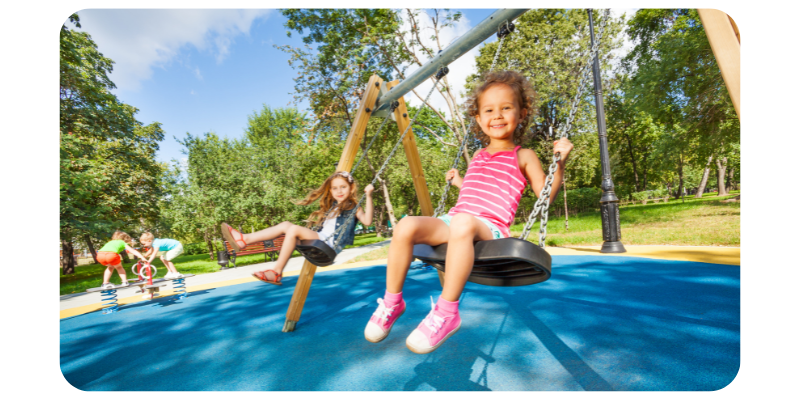Safe Outdoor Play: Nurturing Child Development in Childcare Programs

Outdoor play is a cornerstone of childhood development, fostering physical health, cognitive growth, and social skills. In childcare programs, creating a safe and engaging outdoor play environment is essential for the well-being of children. This comprehensive guide will delve deeper into the importance of outdoor play, its benefits, and how childcare programs can ensure the safety and enrichment of their young charges.

The Importance of Outdoor Play
- Physical Development
Outdoor play provides opportunities for children to engage in physical activities such as running, jumping, climbing, and swinging. These activities help develop motor skills, strength, and coordination and, exposure to natural elements like fresh air and sunlight contributes to overall physical well-being.
- Cognitive Growth
The outdoors stimulates curiosity and exploration. Children can observe the natural world, fostering an early interest in science and nature, and problem-solving skills are honed as children navigate obstacles and invent imaginative games.
- Social and Emotional Development
Outdoor play encourages social interaction, collaboration, and conflict resolution. Children learn to share, take turns, and communicate with their peers. Time spent outdoors promotes emotional well-being, reducing stress and anxiety.
Ensuring Safe Outdoor Play
- Supervision & Ratios
Adequate adult supervision is paramount. Maintain a low child-to-adult ratio to ensure close monitoring. Trained staff should actively engage with children, promoting safe play and resolving conflicts when necessary.
- Safe Play Area Design
The outdoors stimulates curiosity and exploration. Children can observe the natural world, fostering an early interest in science and nature, and problem-solving skills are honed as children navigate obstacles and invent imaginative games.
- Social and Emotional Development
Create a designated play area with age-appropriate equipment or materials, and Regularly inspect the play area for sharp objects, broken equipment, or tripping hazards.
- Equipment Safety
Ensure all play equipment is in good repair and free of rust, splinters, or sharp edges. Use safety surfacing, like soft mulch or rubber mats, beneath play equipment to cushion falls, and educate staff about the proper use and maintenance of equipment.
- Sun Protection
During sunny weather, provide ample shade through trees, canopies, or shade structures. Encourage children to wear sunscreen, hats, and sunglasses to protect against harmful UV rays.
- Weather Cosiderations
Have a plan for extreme weather conditions, such as heatwaves, storms, or cold temperatures. Monitor weather forecasts and adjust outdoor play accordingly.
- Hydrations & Snacks
Ensure children have access to water at all times, especially during hot weather. Provide healthy snacks to keep kids energized during play.
- Dress Code
Encourage children to wear appropriate clothing and footwear for outdoor activities and educate parents about the importance of sending children to childcare programs with weather-appropriate attire.
- Insect & Pest Control
Implement measures to control pests like mosquitoes and ticks, especially in wooded or grassy play areas, and inform staff and parents on proper insect repellent use.
- First Aid & Emergency Preparedness
Keep a well-stocked first aid kit on hand and ensure staff members are trained in first aid, and develop emergency procedures for injuries, allergic reactions, or other unexpected situations.
- Communication with Parents
Ensure transparent and ongoing communication with parents concerning outdoor play policies and safety protocols, utilizing dedicated parent communication tools. Additionally, promptly share incident reports as needed to keep parents well-informed about their child's experiences and safety during outdoor play.
Outdoor play is essential to childhood development, and childcare programs provide children with safe and enriching outdoor experiences. By prioritizing safety through supervision, equipment maintenance, and proactive measures, childcare programs can create secure and enjoyable outdoor play environments. Regular staff training and communication with parents are essential to a successful outdoor play safety strategy, ensuring that children can reap the benefits of outdoor play while staying protected from potential hazards. Remember, outdoor play isn't just fun; it's a cornerstone of healthy child development.
539